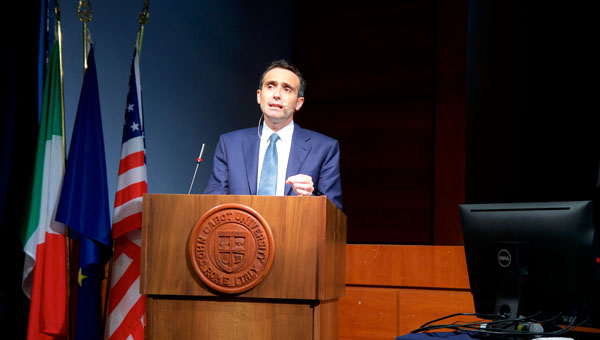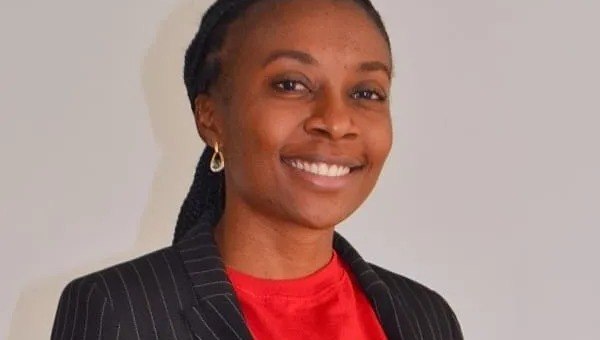Chess and Corporate Strategy: JCU Welcomes Luca Desiata
According to Luca Desiata, author of Chess and Corporate Strategy, knowing how to play chess is an essential skill for managers because it improves strategic thinking and decision-making skills, especially in times of crisis.
Desiata, CEO of SOGIN, the Italian state-owned company responsible for the decommissioning of the country’s nuclear plants, was welcomed to JCU by the Guarini Institute for Public Affairs and the Institute for Entrepreneurship on May 29. The mediators of the event were John Fanti, advisor of the Institute, and journalist Patrizia Feletig.
After earning an MBA from Insead and executive experiences at Enel, the World Bank, Accenture, Bain, and Procter & Gamble, Desiata decided to write the book Scacchi e strategie aziendali (Chess and Corporate Strategy), published in France and Italy. He teamed up with one of the greatest players of all time, Russian 10-year world champion Anatoly Karpov, to develop the metaphor of chess as a guideline for strategic management and negotiation techniques in multilateral diplomacy.
Desiata began his talk with an overview of the history of chess and the political significance of the game. Originating in India with the name chaturaṅga, the game featured 4 military divisions, infantry, cavalry, elephants, and chariotry, represented by the pieces that would evolve into the modern pawn, knight, bishop, and rook, respectively. When it spread westward to Persia, the name became shatranj, and when it reached Europe, it turned into shāh (“king”), and added towers (rooks) to the rest of the pieces.
In the twentieth-century chess acquired political significance, since the Soviet players’ domination was challenged by the Americans, with Fischer’s win in 1972 against Boris Spassky. Fischer’s and Spassky’s tactics in chess paralleled the political tactics used by the US and the USSR during the Cold War. Desiata noted that the correlation between chess and political power continues to this day, since the former world champion Viswanathan Anand is from India and Ju Wenjun from China dominates the Women’s Championship.
Today’s World Chess Champion is Magnus Carlsen from Norway, who will defend his title next November against Italian-American Fabiano Caruana. No American has held the world championship title since Robert Fischer in 1972.
Desiata then explained the connection between chess and business by clarifying the difference between strategy and tactics. The former refers to a mental scheme where the main objective is the modification of reality, while the latter is when the speed of change of reality is faster than our reaction time. Although there are no boundaries to what chess can be applied to, the game seems most suited to expanding our possible responses in strategic thinking, warfare, negotiations, and decision-making.
Playing chess has helped Desiata in his own career path, especially when he stopped playing two-hour games and started playing blitz (5 to 15-minute) games. This took him out of his comfort zone and improved the promptness and quality of his decision-making.
Desiata continued by illustrating an experiment that analyzed the behavior of both chess masters and beginners, taking into consideration the phases of orientation, abstraction, option analysis, and conceptualization. The conclusion was that despite the complexity of the problem, a human mind never loses the thread of the game. Based on a study by the Dutch psychologist Adrian De Groot, a grandmaster’s depth of analysis is similar to a beginner’s, even if beginners tend to focus on static analysis (strengths and weaknesses) of the pieces in the game, while professionals concentrate more on the dynamics of the positions (opportunities and threats) and follow a more direct strategic path. The takeaway from the experiment is that while decision-making capacity is innate, experience is necessary, thus champions are not born, but made. Consequently, in the labor market and particularly in the business world, both recent graduates capable of abstraction and older employees with considerable experience are fundamental assets.
In his concluding remarks, Desiata talked about the relationship between chess and the development of artificial intelligence and recalled that in 1997 an IBM supercomputer called “Deep Blue” beat Harry Kasparov, the reigning World Champion at that time. The event, however, did not mean the end of human superiority: Kasparov and chess players worldwide now use chess computer programs to further master their skills. Moreover, computers have not yet exhausted all the possible moves in chess and it is still possible for chess players to beat computers. The difficulty computer programs have when playing other more complex games (such as Go), prove that the higher the complexity, the more important the role of human intelligence, emotions, and qualitative analysis.
(Greta Rossi and Maria Madyrova)






